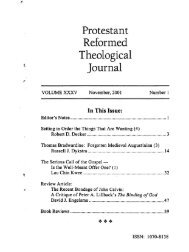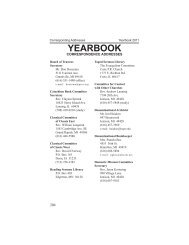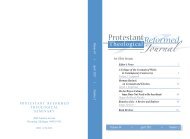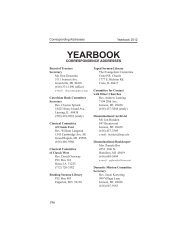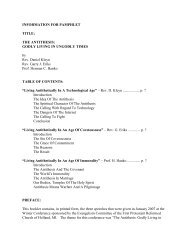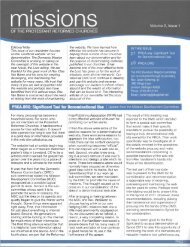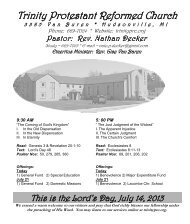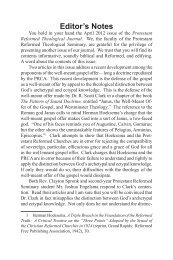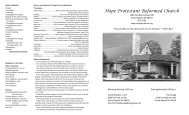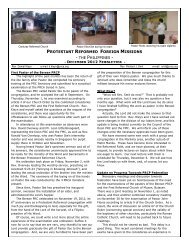November 2007 - Protestant Reformed Churches in America
November 2007 - Protestant Reformed Churches in America
November 2007 - Protestant Reformed Churches in America
You also want an ePaper? Increase the reach of your titles
YUMPU automatically turns print PDFs into web optimized ePapers that Google loves.
<strong>Protestant</strong> <strong>Reformed</strong> Theological Journal<br />
portance of the <strong>in</strong>stituted<br />
church. Emphasiz<strong>in</strong>g that <strong>Reformed</strong><br />
ecclesiology must be<br />
deeply committed to the traditions<br />
and confessions of the<br />
<strong>Reformed</strong> faith, Thomas bemoans<br />
the abandonment by <strong>Reformed</strong><br />
and Presbyterian<br />
churches of their heritage of<br />
Psalm s<strong>in</strong>g<strong>in</strong>g.<br />
114<br />
It is <strong>in</strong>dicative of such rootlessness<br />
that <strong>in</strong>clusive psalm<br />
s<strong>in</strong>g<strong>in</strong>g, for example, has been<br />
abandoned by evangelical<br />
churches and <strong>in</strong>creas<strong>in</strong>gly<br />
m<strong>in</strong>imized <strong>in</strong> <strong>Reformed</strong><br />
churches. It will be a tragic<br />
mistake to consider the adoption<br />
of contemporary worship’s<br />
adoption of popular<br />
culture as value-neutral made<br />
<strong>in</strong> the <strong>in</strong>terests of evangelism<br />
and communication. One<br />
relatively simple remedy for<br />
the church is to discover its<br />
own tradition <strong>in</strong> the s<strong>in</strong>g<strong>in</strong>g of<br />
the psalms—a liturgical practice<br />
that l<strong>in</strong>ks the people of<br />
God with three thousand years<br />
of historical practice. Weekly<br />
s<strong>in</strong>g<strong>in</strong>g of the psalms provides<br />
a sense of cont<strong>in</strong>uity <strong>in</strong> an age<br />
of <strong>in</strong>stantism and throw-away<br />
consumerism that breeds<br />
scepticism and egocentricity<br />
(p. 348).<br />
One disappo<strong>in</strong>t<strong>in</strong>g note, someth<strong>in</strong>g<br />
so squarely <strong>in</strong> conflict<br />
with the historical consciousness<br />
that Thomas calls for, is his<br />
chid<strong>in</strong>g of <strong>Reformed</strong> and Presbyterian<br />
churches for their “refusal<br />
to allow the non-credobaptized<br />
admittance to the<br />
Lord’s Table…” (p. 349).<br />
Kev<strong>in</strong> Vanhoozer’s contribution<br />
was, <strong>in</strong> the estimation of<br />
this reviewer, too long and<br />
overly philosophical. But there<br />
are more serious matters. For<br />
one th<strong>in</strong>g, Vanhoozer criticizes<br />
those who view the content of<br />
Scripture as propositional truth,<br />
fault<strong>in</strong>g both Charles Hodge<br />
and Carl F.H. Henry for this <strong>in</strong>adequate,<br />
as he supposes,<br />
view of Scripture.<br />
… Hodge’s decision to read<br />
the Bible as a book of div<strong>in</strong>ely<br />
revealed facts predisposes<br />
him to focus on the Bible’s<br />
content and to construe this<br />
content as propositional<br />
teach<strong>in</strong>g. Such a focus on revealed<br />
content runs the risk of<br />
neglect<strong>in</strong>g the larger canonical<br />
context and literary form<br />
of the biblical “facts”, perhaps<br />
the <strong>in</strong>evitable result of biblical<br />
empiricism (p. 137).<br />
… the Bible is not merely an<br />
epistemological foundation—<br />
either a “storehouse of facts”<br />
(Hodge) or a deposit of<br />
propositional revelation<br />
Vol. 41, No. 1



